

BBC News United Kingdom
Thursday, 14 September 2006, 09:06 GMT 10:06 UK
As Bolivian President Evo Morales tries to implement a controversial "agrarian revolution", the BBC's Damian Kahya visits the east of the country to talk to both settlers and landowners.
Land is a cause of conflict now in Bolivia.
A recent survey by the Catholic Church here found that just 50,000 families own almost 90% of Bolivia's productive land.
Evo Morales, the country's first indigenous president, was elected earlier this year on a platform promising to redistribute land.
Few of his constituents are large landowners - most are members of Bolivia's poor, indigenous majority.
They want the state to take the land. Otherwise, some say, they will do so themselves.
But the task is proving harder than imagined, with a key law facilitating government appropriation of unused private land stuck in the senate.
Waiting
In the eastern province of Santa Cruz, large landowners say they are hiring armed groups to protect their property from the landless and from alleged illegal activity by the state.
In the same province, indigenous organisations claim to have registered 22,000 families who are landless or land poor.
While the reform is stalled, tensions in the region are increasing. Bolivia's Permanent Assembly for Human Rights reported eight deaths this year.
A six-hour drive from the city of Santa Cruz is Nucleo 29, a tiny hamlet of about 30 houses which sits on the edge of an inaccessible field, surrounded by swamp.
Most of the villagers here came from Bolivia's barren Altiplano (high plateau in the Andes) in search of land.
They moved onto the field five years ago, claiming it was unused.
Last year they were violently removed by the police and one of them died. His gravestone sits at the entrance to the village.
But the settlers are still here, waiting to get the land back.
Building houses
We arrived past midnight and found them huddled in a group inside a makeshift school.
They will not talk to the local press here, who call them terrorists, so at the meeting we were introduced as "the BBC from London, USA".
"We lived here five years," says Anto Lopez. "Then, a year ago the owner came. This hurt because she was taking our work, our houses.
"Our decision is to stay here until death and fight for our children. We hope the president will resolve this problem for us as quickly as possible."
Back in the village, we could see that the field was now being used by its owner.
But the settlers have not given up. Instead they are building new houses and working what land they can.
Village leader Santo Garcia explained: "We're living here illegally. We have no social function, we don't pay any taxes. Nothing. Therefore we want the government to give back the land to families who have nothing."
"We have nothing to eat," adds Leona Cruz. "We want to take this land, so we can work it and give our children food."
'No protection'
But to give back land to these people the government must first take it away from others.
There have been cases where the landless movement has gone in and set fire to camps and houses
Branco Marinkovic
We contacted one of the largest regional landowners, Branco Marinkovic, and were told to meet him at 6.30am outside Hanger 19 in Santa Cruz's central airport.
In unseasonal wind and rain we flew low over his 12,000 hectares (30,000 acres) of land. He pointed out the clearings in the forest making way for new rice and soya fields in this, the most productive part of Bolivia.
Back on the ground, he described the problems he and his fellow landowners were experiencing.
"These people have been going into farms and into land that is being used. There have been cases where the landless movement has gone in and set fire to camps and houses."
And, are the police protecting land such as his? "No," is the reply.
So how does he defend his land?
"You can't go out and start shooting each other," he says. "I mean that would not be civilised and we don't want this country to go to civil war."
As we tour the sunflower plantation, in full bloom during the supposed dry season, I ask Mr Marinkovic if he thinks the government might send in the police or army to take his land.
"It might happen, I mean its happened in Venezuela... It would be a shame if we could compare ourselves in a few years time to Rhodesia (Zimbabwe) or some other African country," he says.
With the two sides so polarised it seems clear the president will have to negotiate in order to achieve an orderly land reform. But it is not yet clear he is willing to do so.
As the situation stands, tension and conflict here in Bolivia's "wild east" will only increase.
